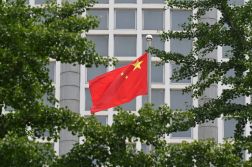Dmitri Alperovitch on Taiwan, China and Putin’s probing cyberattacks

Dmitri Alperovitch, former CTO of CrowdStrike, co-founded the Silverado Policy Accelerator last year as a new kind of think tank to bring a venture capital mindset to preserving American hegemony. As such, he’s thinking a lot lately about the growing threat from China. We sat down with him at the recent Cipher Brief Threat conference where he led a war game exercise focused on a hypothetical Chinese invasion of Taiwan. The interview has been edited for length and clarity.
Why present a war game on a hypothetical Chinese invasion of Taiwan?
One of the things that is important to understand about the U.S. response to an invasion of Taiwan is not just [whether] the U.S. gets involved, but what kind of involvement it would take. Is it just going to be limited to repelling invasion? Is it going to be strikes on mainland China, which may be followed by strikes on the U.S. homeland? It’s also important to prepare the American public for that because what we have not done is explain to the public why Taiwan matters so much.
Taiwan is essential to U.S. national security interests because of its geographic location. China having Taiwan enables them to project power across the entire Pacific, which is the future of the global economy and American prosperity. But those are the sorts of arguments that have not been made to the American public.
Do you believe China will invade Taiwan? And if so, when?
It’s very likely, but I don’t think it’s likely anytime soon. The U.S. government projections are that they’re trying to be prepared for invasion by 2027. I firmly believe that whether or not China invades is mostly in Taiwanese hands, because they’re an island of 23 million people. If that population actually gets conscripted and trained — really trained, not the minimal amount of training they’re getting now — they can make this invasion a complete impossibility. If they don’t make the right decisions, there’s very little that we can do. And if they choose not to fight, or if Taiwan falls within 48 hours, there’s nothing we can do to take it back. Unfortunately, up until now, we have not seen Taiwan make the right, hard decisions that Ukraine has made since 2014.
And what about the cyber aspects of the China Taiwan dynamic?
Cyber is always an element of both espionage and warfare as we’re seeing today in Ukraine, as we’ve seen from China for several decades now. It’s not going to be a decisive element of it. Taiwan has a unique vulnerability — it’s an island. Unlike Ukraine, there’s no Poland that is nearby to resupply Taiwan. Virtually all the communications come through undersea cables that could get cut. Some are satellite enabled and could be disrupted through cyberattacks, as we have seen in Ukraine. Imagine a situation where Taiwan is nearly cut off from the outside world. Look at what Ukraine has been able to do by putting out Zelensky videos every night, by having him communicate on virtually every TV channel to rally support for his country. If someone is not able to do that, it’s going to be much more difficult for them to rally the world to their cause.
What is your reaction to the Biden administration’s sweeping new restrictions on the export of semiconductor chips to China?
The export control measures that the administration took are quite unprecedented. They’re effectively going to cripple the Chinese chips industry because so much of that industry depends on imports of American and Western technologies. And these export controls are going to massively limit the ability of the Chinese to procure those systems. So, it’s going to slow them down potentially for a decade or more. That’s a very good thing because as long as China is dependent on the West for chips, they’re going to be much less likely to invade. It’s a critical component of deterrence.
Do you expect to see Russian President Vladimir Putin ratchet up cyberattacks in the coming months, particularly if events continue as they have been with his back increasingly against the wall?
They’re pretty much throwing everything but the kitchen sink at Ukraine already in cyber, but they have been remarkably restrained — surprisingly so — against the West. What you’re seeing now, particularly in the last couple of months, is him slowly escalating vis-a-vis the West and you’ve seen that in his energy policy, shutting down Nord Stream One. If he’s behind the blowing up of the Nord Stream One and Nord Stream Two pipelines, that would be another indication of major escalation. So, you could see him increasingly probe and try to test the West, and cyber could be part of that.
Former CIA and NSA Director General Hayden said here yesterday that he thinks there’s a 50/50 chance America won’t survive largely because of how divided we are by disinformation and the like. Is that too cynical?
We’ve gone through much worse periods in our history. I think our survival was much more at risk in 1776. I think our survival was in great danger in the 1860s, during the Civil War. We’re nowhere close to those divisive moments in history. There’s no question that we have a lot of challenges in this country today — both internal challenges and external challenges — but I’m a long-term bull on America. I think that we’ll overcome our differences. This country has always rallied around the flag when presented with an existential threat from overseas and I think we’re facing one now, with China.

This story was featured in CyberScoop Special Report: War in Ukraine



